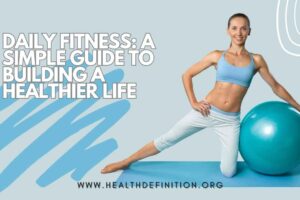
The Benefits of Exercise our fast-paced world, it’s easy to overlook our health while chasing deadlines, managing responsibilities, and balancing work and family life. But one timeless truth stands firm: regular physical exercise is essential for overall well-being. Whether you’re walking in the park, swimming laps, hitting the gym, or practicing yoga, physical activity offers a wide range of benefits for your body, mind, and spirit. In this article, we’ll explore the top benefits of exercise, backed by real-world examples and science, and help you understand why moving your body regularly could be the best decision you’ll ever make.
Improves Physical Health
One of the most apparent benefits of regular exercise is improved physical health. Engaging in physical activity helps strengthen your heart, lungs, and muscles. It enhances blood circulation and boosts your immune system, reducing the risk of chronic illnesses such as:
-
Heart disease
-
Type 2 diabetes
-
High blood pressure
-
Obesity
-
Certain types of cancer
When you exercise, The Benefits of exercise your body becomes more efficient at using oxygen, and your energy levels rise. Over time, your body composition improves, and you experience better coordination, balance, and flexibility.

Supports Mental Health
Beyond physical improvements, The Benefits of exercise are a proven way to support mental well-being. Regular movement can help manage symptoms of anxiety, depression, and stress. During exercise, your brain releases endorphins—natural chemicals that promote a sense of happiness and calm.
Exercise also stimulates the release of dopamine and serotonin, neurotransmitters linked to mood regulation. Even a 30-minute walk or a short jog can make a noticeable difference in your mood and cognitive function.
Boosts Brain Power and Memory
Exercise doesn’t just make your body fit—The Benefits of Exercise it keeps your brain sharp. Studies show that physical activity can improve memory, focus, and learning. Activities that require coordination, such as dancing or martial arts, enhance neural connectivity and increase gray matter in the brain.
Older adults who engage in regular physical activity are less likely to suffer from cognitive decline and memory-related disorders like Alzheimer’s disease. Incorporating aerobic and strength-training workouts into your weekly routine can keep your mind sharp well into your later years.
Helps With Weight Management
If you’re looking to lose weight or maintain a healthy body composition, The Benefits of exercise is a critical part of the equation. Physical activity burns calories, increases metabolism, and helps build lean muscle mass. When combined with a balanced diet, exercise can lead to sustainable weight loss and improved body confidence.
It’s not about intense workouts every day—moderate activities such as walking, biking, or dancing for 30–60 minutes most days of the week can produce long-lasting results.
Enhances Sleep Quality
Struggling with sleep? Exercise might be the answer. Regular physical activity helps regulate your circadian rhythm and promotes deeper, more restful sleep. It also reduces stress and anxiety levels, which are common culprits of sleep disturbances.
Just be mindful not to exercise too close to bedtime, as intense workouts may temporarily elevate your heart rate and energy levels.

Builds Discipline and Self-Esteem
Committing to a regular workout routine cultivates discipline and strengthens your sense of control. The Benefits of Exercise Meeting your fitness goals—whether it’s running your first 5K or mastering a yoga pose—can give you a powerful sense of accomplishment.
Exercise also improves self-image. As your body becomes stronger and healthier, The Benefits of exercise your confidence naturally grows. You’ll start to feel more comfortable in your skin and capable of facing life’s challenges.
Promotes Longevity
Studies consistently show that people who exercise regularly tend to live longer and enjoy a higher quality of life. Exercise reduces the risk of premature death and age-related illnesses. It keeps your muscles and joints functioning well, which means you’re more likely to stay active and independent as you age.
Even modest activity levels can have a significant impact. A brisk 20-minute walk every day can add years to your life and improve your overall outlook.
Encourages Social Interaction
Exercise can also be a great way to connect with others. Group fitness classes, walking clubs, sports teams, and dance groups all provide opportunities to build social connections. These interactions contribute to emotional well-being and reduce feelings of loneliness or isolation.
Working out with a partner or group also increases motivation and accountability, making it more likely that you’ll stick to your fitness routine.
Improves Productivity and Focus
Whether you’re a student, an entrepreneur, or a working professional, regular exercise can sharpen your focus and boost productivity. Physical activity improves blood flow to the brain, which enhances concentration and decision-making.
Taking short movement breaks during the day, like a quick walk or stretching session, The Benefits of Exercise can refresh your mind and improve work performance.
Fosters a Positive Lifestyle
Exercise often becomes a catalyst for other healthy habits. When you move regularly, you’re more likely to eat healthier, drink more water, get enough sleep, and avoid harmful behaviors such as smoking or excessive alcohol use.
It creates a positive feedback loop that benefits every area of your life—physical, emotional, and social.
Regular The Benefits of exercise has more benefits than just a fitness trend—it’s a powerful lifestyle choice that transforms your body, sharpens your mind, and uplifts your mood. From boosting heart health and brain function to enhancing sleep, reducing stress, and increasing longevity, the benefits of physical activity extend far beyond the gym. Whether you’re a beginner or a seasoned athlete, consistent movement is the key to unlocking a healthier, happier, and more vibrant life.

Final Thoughts
Exercise is more than a tool for weight loss or building muscle—it’s a lifestyle habit that promotes total wellness. The benefits of exercise extend far beyond the gym or a workout mat. From boosting your energy and reducing disease risk to enhancing your mental clarity and emotional balance, regular movement is a powerful medicine.
If you haven’t already, consider making exercise a non-negotiable part of your daily routine. Start small, stay consistent, and find activities you enjoy. Your body and mind will thank you.
FAQ About the Benefits of Exercise
1. How much exercise do I need per week?
According to the World Health Organization, adults should aim for at least 150 minutes of moderate-intensity aerobic activity or 75 minutes of vigorous-intensity activity per week, combined with muscle-strengthening activities on two or more days.
2. What are some easy exercises for beginners?
Great beginner-friendly exercises include:
-
Walking
-
Cycling
-
Swimming
-
Bodyweight exercises (e.g., squats, push-ups)
-
Yoga or stretching routines
Start slow and gradually increase intensity as your fitness improves.
3. Can exercise help with anxiety and depression?
Yes. Exercise releases endorphins and serotonin, which are natural mood boosters. Regular physical activity is proven to reduce symptoms of anxiety, stress, and mild to moderate depression.
4. Is walking considered effective exercise?
Absolutely. Brisk walking is a low-impact, highly effective cardiovascular exercise. It improves heart health, aids in weight loss, and supports mental clarity, especially when done consistently.
5. What are the best times to exercise?
The best time is when it fits your schedule and you can do it consistently. Some people prefer morning workouts to boost energy, while others enjoy evening sessions to relieve stress. Choose what works for your body and lifestyle.
6. Can I lose weight through exercise alone?
Exercise helps with weight loss, but combining it with a healthy, calorie-conscious diet is more effective. Strength training also helps build muscle, which increases metabolism and supports fat loss.
7. How does exercise improve sleep?
Physical activity helps regulate your body clock and reduces stress, which leads to better sleep quality. The Benefits of Exercise. Just avoid intense workouts close to bedtime, as they may temporarily increase alertness.
8. Do I need a gym membership to stay fit?
Not at all. Many effective workouts can be done at home using body weight, resistance bands, or simple equipment. Outdoor activities like walking, jogging, or hiking are also great options.
9. How soon will I see results from exercise?
Results vary by individual, but many people start noticing increased energy, better mood, and improved sleep within 2–4 weeks. Physical changes such as weight loss or muscle gain typically become more visible after 6–8 weeks of consistent exercise.
10. Is daily exercise safe?
Yes, daily moderate exercise like walking, stretching, or light strength training is safe for most people. It’s important to include rest or active recovery days, especially if you’re doing intense workouts, to allow your body to heal and grow stronger.
Bullet Points: Benefits of Exercise
-
Boosts energy levels by improving cardiovascular efficiency
-
❤️ Strengthens heart health and lowers the risk of chronic diseases
-
Enhances brain function, focus, and memory
-
Improves mood and reduces symptoms of anxiety and depression
-
♀️ Aids in weight management and supports fat loss
-
Promotes better sleep and helps regulate sleep patterns
-
Builds muscle and bone strength, improving overall body function
-
Reduces stress and promotes mental clarity
-
Increases productivity, motivation, and cognitive performance
-
Slows aging and helps maintain mobility with age
-
Encourages social interaction through group activities
-
Fosters healthy lifestyle habits like better eating and hydration
-
️ Boosts confidence and self-esteem through goal achievement
-
Adds longevity and improves quality of life over time






